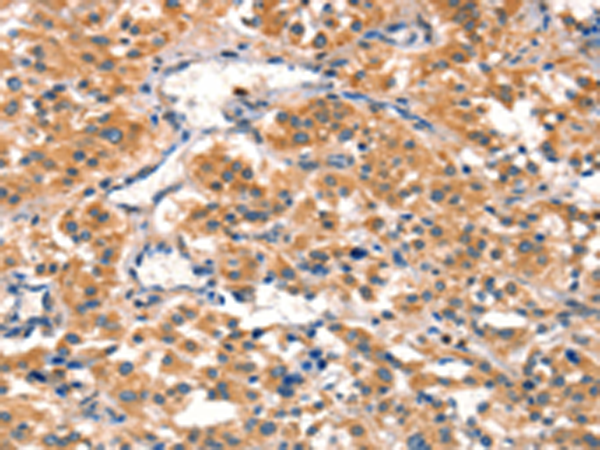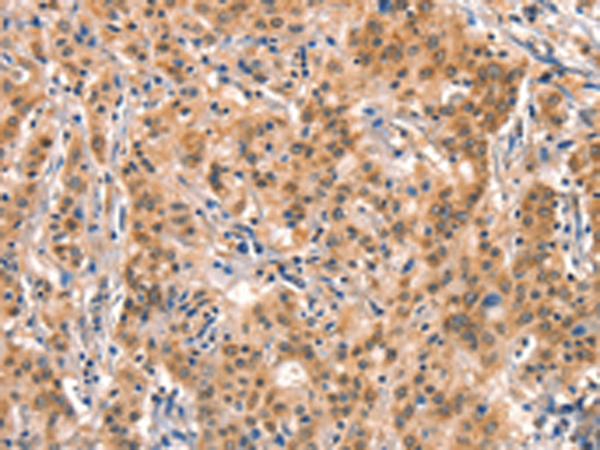


| WB | 咨询技术 | Human,Mouse,Rat |
| IF | 咨询技术 | Human,Mouse,Rat |
| IHC | 1/50-1/200 | Human,Mouse,Rat |
| ICC | 技术咨询 | Human,Mouse,Rat |
| FCM | 咨询技术 | Human,Mouse,Rat |
| Elisa | 1/2000-1/5000 | Human,Mouse,Rat |
| Aliases | p43; HLD3; EMAP2; SCYE1; EMAPII |
| WB Predicted band size | 34 kDa |
| Host/Isotype | Rabbit IgG |
| Antibody Type | Primary antibody |
| Storage | Store at 4°C short term. Aliquot and store at -20°C long term. Avoid freeze/thaw cycles. |
| Species Reactivity | Human, Mouse |
| Immunogen | Synthetic peptide of human AIMP1 |
| Formulation | Purified antibody in PBS with 0.05% sodium azide and 50% glycerol. |
+ +
以下是3篇关于AIMP1抗体的研究文献摘要,按领域分类列举:
---
1. **文献名称**:*AIMP1 as a tumor suppressor in glioblastoma*
**作者**:Kim JY et al.
**摘要**:研究揭示AIMP1通过调控EGFR信号通路抑制胶质母细胞瘤生长。作者使用特异性AIMP1抗体进行免疫印迹和免疫组化,证明AIMP1低表达与患者预后不良相关,抗体检测为肿瘤标志物研究提供依据。
---
2. **文献名称**:*AIMP1 mediates TNF-α-induced inflammatory response in macrophages*
**作者**:Park SG et al.
**摘要**:探讨AIMP1作为细胞因子在炎症中的作用。通过AIMP1中和抗体阻断实验,发现其可抑制巨噬细胞中NF-κB通路的激活,表明AIMP1抗体在抗炎治疗中的潜在应用价值。
---
3. **文献名称**:*Development of a monoclonal antibody against human AIMP1*
**作者**:Lee SW et al.
**摘要**:报道一种高亲和力抗人AIMP1单克隆抗体的开发与验证。研究通过ELISA、流式细胞术和免疫荧光证明该抗体特异性,并应用于检测血清AIMP1水平,为疾病诊断提供新工具。
---
**备注**:若需具体文献来源(期刊、年份),建议在PubMed或Web of Science中以"AIMP1 antibody"、"anti-AIMP1"为关键词检索,可筛选出抗体开发、癌症机制或炎症相关的应用研究。
The AIMP1 (aminoacyl tRNA synthetase complex-interacting multifunctional protein 1) antibody is a tool used to detect AIMP1. a protein encoded by the *AIMP1* gene. Originally identified as a non-enzymatic component of the multi-tRNA synthetase complex (MSC), AIMP1 (also known as p43 or SCYE1) plays roles in translation regulation, cytokine signaling, and extracellular processes. Structurally, AIMP1 contains an N-terminal GST-like domain and a C-terminal cytokine-like domain, enabling interactions with MSC components and extracellular receptors.
Functionally, AIMP1 acts as a secreted cytokine, modulating immune responses, angiogenesis, and inflammation via pathways like TGF-β and NF-κB. It is implicated in neurodegenerative diseases (e.g., Alzheimer’s), cancer progression, and autoimmune disorders. Studies show AIMP1's dual role: intracellularly, it stabilizes the MSC and regulates tRNA processing; extracellularly, it binds to receptors such as CXCR4. influencing cell migration and apoptosis.
AIMP1 antibodies are widely used in techniques like Western blotting, immunohistochemistry, and ELISA to study its expression, localization, and interactions. Research highlights its dysregulation in tumors, neuronal damage, and inflammatory conditions, making it a potential therapeutic target. Antibody specificity is critical due to post-translational modifications (e.g., phosphorylation) and splice variants. Commercial antibodies often target epitopes within its N-terminal (e.g., residues 1-150) or C-terminal regions, enabling diverse experimental applications in biomedical research.
×